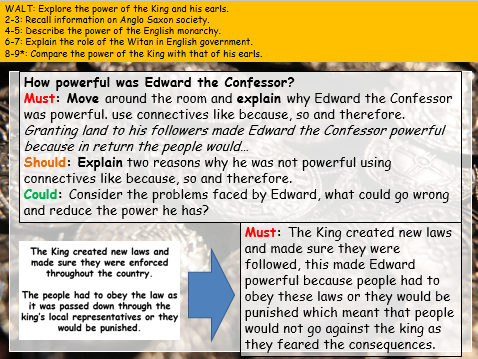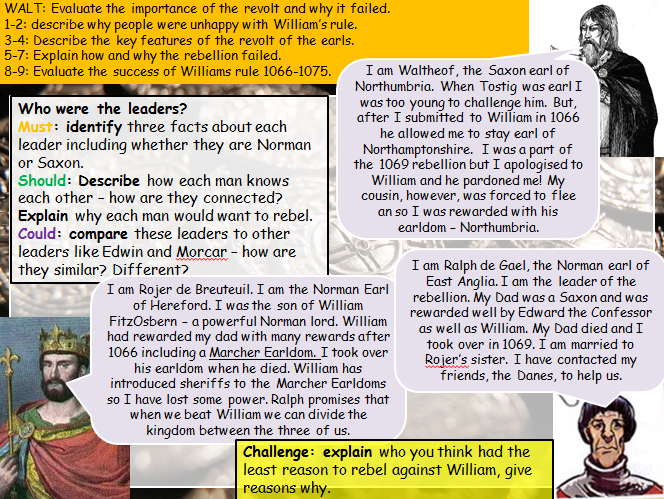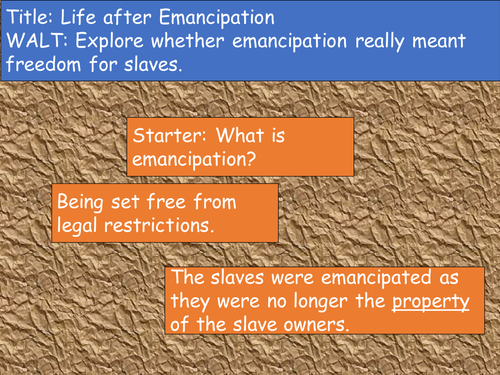
177Uploads
74k+Views
23k+Downloads
All resources

Kings and Earls comparison (Edexcel 9-1: Anglo Saxon and Norman England)
This lesson has been designed to embed comparison skills needed for the 16 mark question in paper two Anglo-Saxon and Norman England.
Pupils will:
WALT: Explore the power of the King and his earls.
2-3: Recall information on Anglo Saxon society.
4-5: Describe the power of the English monarchy.
6-7: Explain the role of the Witan in English government.
8-9*: Compare the power of the King with that of his earls.
Tasks include:
a carousel
comparison worksheet in which pupils catagorise their ideas and develop comparative thought.
16 mark question with support for PEEL paragraph structuring.
AFL and differentiation throughout

Anglo-Saxon Local Govenment (Anglo-Saxon and Norman England (Edexcel 9-1))
WALT: Examine the government of Saxon England at a local level.
2-3: Identify and define key words.
4-5: Describe the role of the Shire Reeve.
6-7: Explain how the legal system works in Anglo Saxon England.
8-9*: Evaluate the impact of collective responsibility.

Hereward the Wake and the rebellion at Ely (Anglo-Saxon and Norman England (Edexcel 9-1))
WALT: Explain what caused the Ely rebellion and why it failed.
1-2: recall and describe key features of previous rebellions studied.
3-4: Describe the role of Hereward the Wake in the Ely rebellion.
5-7: Explain the causes, main developments and consequences of the Ely rebellion.
8-9: Evaluate how and why the Ely rebellion failed.
Pupils will:
starter: complete choice of two exam questions, green pen and improve/attempt other exam question if full marks.
discussion: why the fens at Ely? link back to Gate Fulford.
Worksheet task: explain key features of the rebellion, link back to 1068 and 1069 rebellions
Explain task: why did the rebellion fail?
exam question: how far did you agree, exam plan and sentence starters.

Medicine Through Time key words (Edexcel 9-1)
Three page document of key words for the Medicine through time unit and the historic environment (Medicine on the Western Front).
I used the pearson textbook and went through cover to cover to produce a document of all key words to support pupils with the content prior to examination.

Revolt of the Earls 1075 (Anglo-Saxon and Norman England (Edexcel 9-1))
WALT: Evaluate the importance of the revolt and why it failed.
1-2: describe why people were unhappy with William’s rule.
3-4: Describe the key features of the revolt of the earls.
5-7: Explain how and why the rebellion failed.
8-9: Evaluate the success of Williams rule 1066-1075.

'What is history?' introductory lesson (What is History? (KS3))
The first lesson in a scheme of work designed to introduce KS3 pupils to the concept of history and help them acquire historical skills.
WALT: identify key historical skills and explain why history is important.
L3: Define what the study of history is.
L4: Describe key skills a good historian needs.
L5: Explain why history is important.
L6: compare history to another subject and justify which you think is most important.
Pupils define what history is in their own words.
Investigation of blooms words, describe, explain, infer etc.
Discussion of what history is, prior learning and a video.
Lesson includes homework for pupils to complete, teacher can use homework to gain a baseline of pupils ability.

Weimar and Nazi Germany Timeline and Lesson (Edexcel 9-1)
Timeline with sections for pupils to create - worksheet to support.
Fully differentiated lesson to go alongside the timeline.
Starter: structure of Paper three
task one: overview video
Task two: timeline - defining key words, describing key events and extension task
Whiteboard AFL
Task Three source work - why vote for hitler? challenge: making links to key events on the timeline
Task designed as an introductory lesson to paper three to give pupils an overview of the topic so assumes no prior knowledge but could also be used as a revision task.

SKILLS BUILDER! Explain the importance (Edexcel 9-1: The American West)
WALT: explore the key skills needed to reach full marks on an ‘importance of’ question.
Recall prior knowledge from the Norman unit.
Describe the assessment objectives and mark scheme.
Analyse and criticise an example answer.
Apply my understanding to an exam question to demonstrate my knowledge.
This lesson has been created to build students confidence with using and applying assessment objectives to their learning - i have found that through using skills builders students grow in confidence and full marks seems more attainable.
Students annotate the mark scheme and an example answer before applying their knowledge to a new question and marking their peers work to demonstrate further undertstanding.
The starter activity recalls prior knowledge of the Normans topic, however the task from slide 11 could easily be moved to the starter if you do not teach this topic/ have not taught it prior to this lesson.

WW1 REVISION: Gas! (EDEXCEL 9-1: Western Front MTT)
WALT Analyse sources to explain how gas was used during WW1.
Recall key features of the main battles of WW1.
Identify key features of the first use of mustard gas.
Describe the three types of gas used in WW1 in detail. Explain how they harmed a soldier.
Apply: Analyse sources to evaluate their utility.
The first task recaps the main features of battles in WW1. the main body of the lesson revises key knowledge of gas attacks, before focusing keenly on source skills using the IS-SAYS-KNOW structure and modelling the answer to the first source as a group.

Later Public Health 1854-1900 (EDEXCEL 9-1: Medicine Through Time)
WALT: Evaluate the progress made to Public Health 1850-1900
Recall features of the Public Health Act of 1875.
Describe developments in Public Health before 1854.
Explain how and why the approach towards Public Health changed after 1850.
Apply: Explain why there was progress in Public Health 1850-1900 (12 marks).
Students recall (starter and wilf 1) knowledge on early public health and the Public Health Act (taught previously) before building on this with knowledge about the Great Stink and three key acts that can be used as evidence the government abandoned their Laissez-Faire ideology. This leads to a tiered apply task in which students can connect their knowledge coherently in response to a 12 mark question.

Government action through time REVISION (EDEXCEL 9-1: Medicine Through Time)
WALT Evaluate changes in government action and attitude.
Summarise government attitudes in each period using a phrase.
Identify actions taken by the government during each plague.
Explain how government actions differed.
Apply: Analyse the importance of government action and apply knowledge to a past paper exam Q.
Students revise core knowledge - focusing firstly on the two plague case studies in reference to a past paper exam, before moving through to compare GOVT actions 1700-1900 and 1900-present and applying their understanding to an exam question. Each task is fully reviewed with green pen improvement slides provided.

Were the slaves really free after the Emancipation Proclamation?
To follow American abolition lesson.
Differentiated carousel task that considers the positive and negative developments that faced freedmen following the E.P:
Jim Crow, Black Codes, etc.
Carousel hidden slides to print
Full lesson, build up towards a how far do you agree question.

What is Slavery? Introduction
What is slavery?
Comparison activity of slavery - Egyptian, Medieval, Empirical and Modern
Source analysis
Level 3-6 (NC) differentiation
Homework activity - pupils to research the four periods and draw a picture to represent slavery during that time period.

American West Revision Guide for Edexcel 9-1 2017
I have created this revision guide aimed at KS4 Edexcel 9-1 for the 2017 specification.
It includes sections about:
Plains Indians,
Indian Wars,
Homesteaders,
Cattle Industry
Each section has information sheets, revision ideas, key words and a quick quiz (all answers to the quiz are in the back of the book).

Edexcel Nazi Germany Independent Revision Guide
Revision guide created cross referenced with the Edexcel textbook and specification.
Focus on knowledge with guidance suggesting how pupils may revise.
Structure:
Pupil knowledge audit
2 A4 pages per quarter of the unit (weimar, rise to power etc)
Checklist of revision ideas (create a facebook profile, create a mindmap, research etc) guidance to develop independent learners
quick quiz (answers in the back)
worksheet 1x section so that you can set guided revision homework
The revision guide follows the structure of the textbook:
Weimar
Rise to Power
Nazi Control
Life in Nazi Germany

Slave Rebellion and Opposition 18th-19thC
Carousel task including:
Stono Rebellion
NY City Conspiracy
Gabriel's Conspiracy
German Coast Uprising
Nat Turner's Rebellion
Investigation of interpretations
Peer assessment
Worksheets as hidden slides

Gate Fulford 1066 (full lesson with animated battle strategy)
Full lesson aimed at KS3 examining that battle of Gate Fulford.
WALT: Examine the events of Gate Fulford.
WILF 1: Identify key things that happened at Gate Fulford. L3.
WILF 2: Describe what happened at Gate Fulford. L4.
WILF 3: Explain why Edwin and Morcar lost the Battle of Gate Fulford. L5.
Fully animated battle strategy.
Discusses Tostig, Hardrada, Edwin and Morcar - lesson has been aimed at preparing KS3 to study Normans at KS4 through the Edexcel examination board.
Differentiation and worksheets as hidden slides within the powerpoint

Norman Invasion: Housecarls V. Knights
Full lesson - taught to y7 and y10 fits Edexcel specification (Anglo-Saxon and Norman England 1060-1088).
Worksheets as a hidden slide within the powerpoint. Very successful when taught to year 10 pupils.
Polish differentiation included.

Why were people unhappy under William the Conqueror?
Full lesson - worksheet as a hidden slide within the powerpoint. worksheet provides pupils with five things William changed and they write a speech expressing their discontent with these changes.
Introduces pupils to the changes made by William following the Battle of Hastings and starts to unpick reasons Saxons disliked Norman rule.
Levelled extended writing task differentiated for all pupils and discussion of the word consequence, what it means and how pupils should respond to it within their writing included.

Slavery Bundle (7 lessons with homework, differentiation and fully resourced)
Skills building unit surrounding slavery in the British Empire and the Americas, developing skills towards KS4 GCSE. Aimed at Y8 KS3, fully differentiated for level 3-6.
Lessons:
What is slavery,
Slave trade triangle
Punishments
Opposition and rebellion
Abolition in America
Abolition in Britain
Were slaves really freed?
Homework:
Comparative cartoon homework
Abolitionist profile




















